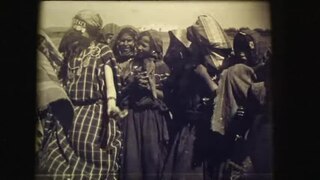Related Research Articles
Mohamed Chouikh is an Algerian film-maker and actor.

Zohra is a 1922 silent 35 mm short film from Tunisia by Albert Samama ('Chikly'). It was the first indigenous North African film production. The movie script was written by Chikly's daughter, Haydée Chikly, who also edited and starred as the key female protagonist in the film.
The cinema of Gabon has had an uneven history. Though President Omar Bongo and his wife, Josephine Bongo, encouraged filmmaking in the 1970s, there was a 20-year hiatus until filmmaking started to grow again in the new millennium.
Didier Florent Ouénangaré (1953–2006) was a film director from the Central African Republic, best known for his collaboration with Cameroonian filmmaker Bassek Ba Kobhio on The Silence of the Forest, an adaptation of a novel by Étienne Goyémidé.
The Great White Man of Lambaréné is a 1995 biopic of Albert Schweitzer by the Cameroonian filmmaker Bassek Ba Kobhio. The film, made on the site of Schweitzer's hospital at Lambaréné on the Ogooué River in Gabon, has received critical attention as a post-colonial re-interrogation of the myth of Schweitzer.
Benoît Ramampy (1947-1996) was a Malagasy film director.

Moussa Kemoko Diakité is a Guinean cinematographer and film director.

Jean-Marie Teno is a Cameroonian film director and filmmaker, "one of Africa's most prolific filmmakers". His films address censorship, human rights violations, globalization, and the effects of colonialism. Teno has made films in many different forms but favors making documentaries. In an interview when asked about his favor style of film to make he responded, "documentary because when you do fiction, people think it's not true. When it's the documentary, they are embarrassed, embarrassed".
The Central African Republic is one of the world's poorest countries and the film industry is correspondingly small. The first film made in CAR appears to have been Les enfants de la danse, a short French-made ethnographic documentary of 1945. Joseph Akouissone was the first Central African to make a film in the country, with his 1981 documentary Un homme est un homme; he was followed by the documentaries made in the 1980s by Léonie Yangba Zowe. Since then a series of ongoing conflicts and economic crises have severely limited the potential growth of film-making in the country. The first feature-length drama made in the country was Le silence de la forêt, a 2003 CAR-Gabon-Cameroon co-production about the Biaka people.
Le silence de la forêt is a 2003 Central African Republican-Cameroonian drama film directed by Bassek Ba Kobhio and Didier Ouenangare. It is historically the first ever feature film in the Cinema of the Central African Republic. The film was also co-produced in Gabon and Cameroon. The film is adapted based on a novel written by Étienne Goyémidé with the same title Le silence de la forêt. The film was based on the ethnic minority group of African Pygmies and it is also the first film to significantly address the racism of modern Africans towards indigenous ethnic African Biaka people.
Étienne Goyémidé, was a Central African writer and playwright. He is notable as the writer of critically acclaim novels Le silence de la forêt and Dernier Survivant de la caravane.

Mohamed Abdelkrim Derkaoui is a Moroccan director and producer.
The Barber of the Poor Quarter is a 1982 Moroccan film directed by Mohamed Reggab and adapted from a play of the same title by Youssef Fadel. It was the director's sole feature film, and became a Moroccan cult classic. It was screened at the first edition of the National Film Festival in Rabat, where it received as a special mention and the 10th edition of the National Film Festival as part of a series on Moroccan classics. Internationally, the film was screened at Three Continents Festival in 1983, and the Berlin International Film Festival in 1982. The debts incurred for the production of his sole feature film led to Reggab being imprisoned.
The Soul That Brays is 1984 Moroccan film directed by Nabyl Lahlou.
The Night of the Crime is a 1992 Moroccan film directed by Nabyl Lahlou.
Imad Noury is a Spanish-Moroccan filmmaker.
Latif Lahlou is a Moroccan filmmaker.

Joseph Gaï Ramaka is a Senegalese film director, screen writer and film producer.
Clarence Thomas Delgado is a Senegalese film director, film producer, screenwriter and camera operator.
References
- ↑ Armes, Roy (2008). Dictionary of African Filmmakers. Indiana University Press. ISBN 978-0-253-35116-6.
- ↑ "Bassek Ba Kobhio, l'homme qui met le cinéma au cœur de l'Afrique". TV5MONDE (in French). 2017-07-17. Retrieved 2022-10-20.
- ↑ "New cinematography institution to boost film industry". University World News. Retrieved 2022-10-20.
- ↑ Roy Armes (2008). Dictionary of African Filmmakers. Indiana University Press. p. 148. ISBN 978-0-253-35116-6.
- ↑ Roy Armes (2006). African Filmmaking: North and South of the Sahara . Indiana University Press. p. 100. ISBN 0-253-21898-5.
- ↑ Stefanson, Blandine; Petty, Sheila, eds. (2014). "Literary Adaptation". Directory of World Cinema Africa. Vol. 39. Intellect Books. p. 224. ISBN 978-1-78320-391-8.